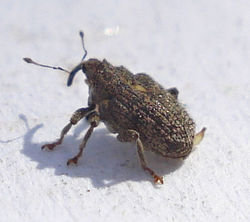Ceutorhynchus pallidactylus
| Literature database |
|---|
| 37 articles sorted by: |
| • year (recent ones first) |
| • research topics |
| • countries/regions |
| • host plants |
| • list of natural enemies |

Author(s): Mick E. Talbot
Source: Wikimedia Commons
Ceutorhynchus pallidactylus (Marsham, 1802) - (cabbage stem weevil)
The weevil is found in Europe where it attacks the stem of oilseed rape, cabbage, cauliflower, cole seeds, turnip, radish, mustard and horse-radish. It has been also reported from North America. Wounds caused by the weevil can lead to infections by the stem canker pathogen, Phoma lingam. Insecticides are commonly applied to prevent significant crop losses.
There is one generation per year. During spring, the female lays eggs into petioles and midribs of leaves of the host plant. The larvae then bore and feed inside the plant, going through 3 larval instars. The mature larvae leave the host plant and enter the soil for pupation. The young adults emerge in the summer, feed on brassicaceous plants and finally migrate to overwinter under plant debris.
| Vernacular names | |
|---|---|
| • Deutsch: | Kleiner Kohltriebrüssler Gefleckter Kohltriebrüssler |
| • English: | cabbage stem weevil cabbage seedstalk curculio |
| • Español: | ceutorinco de la col gorgojo del tallo de la col |
| • Français: | charançon de la tige du chou |
C. pallidactylus resembles Ceutorhynchus napi and has a similar biology. However, it is slightly smaller and has reddish brown tarsi. See C. napi for details.
Synonyms:
Ceutorhynchus quadridens